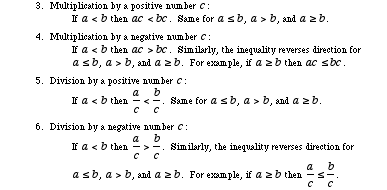What is the largest integer n such that 1/2^n> 0.01?
a)5
b)6
c)7
d)10
e)51
The solution to this problem mentioned in the OG is as follows
Since 1/2^n > 0.01 is equivalent to 2n < 100, find
2"
the largest integer n such that 2" < 100. Using
trial and error, 2^6 = 64 and 64 < 100, but
2^7 = 128 and 128 > 100. Therefore, 6 is the largest
integer such that 2^n > 0.01.
The correct answer is B.
My question is
The inequality sign only flips if u multiply or divide by a negative number, so why does the sign flip in the above case.
Thanks
Inequalities: Reciprocal Rule
This topic has expert replies
GMAT/MBA Expert
- [email protected]
- Elite Legendary Member
- Posts: 10392
- Joined: Sun Jun 23, 2013 6:38 pm
- Location: Palo Alto, CA
- Thanked: 2867 times
- Followed by:511 members
- GMAT Score:800
Hi AkiB,
This question asks us to compare fractions. The decimal .01 can be written as 1/100. Since 1/(2^N) and 1/100 both have numerators that equal 1, we can focus on the denominators. We're asked how big we can make N so that 1/(2^N) > 1/100. For the first fraction to be bigger than the second, the denominator must be SMALLER than 100, BUT we still have to make it as BIG as possible.
In answer to your question, the sign doesn't "flip"; you're actually cross-multiplying the inequality, so....
1/(2^N) > 1/100
becomes....
100 > 2^N
GMAT assassins aren't born, they're made,
Rich
This question asks us to compare fractions. The decimal .01 can be written as 1/100. Since 1/(2^N) and 1/100 both have numerators that equal 1, we can focus on the denominators. We're asked how big we can make N so that 1/(2^N) > 1/100. For the first fraction to be bigger than the second, the denominator must be SMALLER than 100, BUT we still have to make it as BIG as possible.
In answer to your question, the sign doesn't "flip"; you're actually cross-multiplying the inequality, so....
1/(2^N) > 1/100
becomes....
100 > 2^N
GMAT assassins aren't born, they're made,
Rich
-
Matt@VeritasPrep
- GMAT Instructor
- Posts: 2630
- Joined: Wed Sep 12, 2012 3:32 pm
- Location: East Bay all the way
- Thanked: 625 times
- Followed by:119 members
- GMAT Score:780
Here's a nice algebraic approach.
(1/2)� > .01 is really
(1/2)� > 1/100, or
1/2� > 1/100
Since 2� and 100 are both positive, when we cross-multiply, the sign WON'T flip. So we have
100 > 2�
We know that 2�=128 > 100 > 2�=64, so n must be 6.
(1/2)� > .01 is really
(1/2)� > 1/100, or
1/2� > 1/100
Since 2� and 100 are both positive, when we cross-multiply, the sign WON'T flip. So we have
100 > 2�
We know that 2�=128 > 100 > 2�=64, so n must be 6.
- GMATinsight
- Legendary Member
- Posts: 1100
- Joined: Sat May 10, 2014 11:34 pm
- Location: New Delhi, India
- Thanked: 205 times
- Followed by:24 members
For better understanding of the rules of Inequality, Please see the rules below:AkiB wrote:What is the largest integer n such that 1/2^n> 0.01?
a)5
b)6
c)7
d)10
e)51
The solution to this problem mentioned in the OG is as follows
Since 1/2^n > 0.01 is equivalent to 2n < 100, find
2"
the largest integer n such that 2" < 100. Using
trial and error, 2^6 = 64 and 64 < 100, but
2^7 = 128 and 128 > 100. Therefore, 6 is the largest
integer such that 2^n > 0.01.
The correct answer is B.
My question is
The inequality sign only flips if u multiply or divide by a negative number, so why does the sign flip in the above case.
Thanks
Inequality Rules


Transitive Property of Inequalities
If a < b and b < c , then a < c.
If a ≤ b and b ≤ c , then a ≤ c.
If a > b and b > c , then a > c.
If a ≥ b and b ≥ c , then a ≥ c.
"GMATinsight"Bhoopendra Singh & Sushma Jha
Most Comprehensive and Affordable Video Course 2000+ CONCEPT Videos and Video Solutions
Whatsapp/Mobile: +91-9999687183 l [email protected]
Contact for One-on-One FREE ONLINE DEMO Class Call/e-mail
Most Efficient and affordable One-On-One Private tutoring fee - US$40-50 per hour
Most Comprehensive and Affordable Video Course 2000+ CONCEPT Videos and Video Solutions
Whatsapp/Mobile: +91-9999687183 l [email protected]
Contact for One-on-One FREE ONLINE DEMO Class Call/e-mail
Most Efficient and affordable One-On-One Private tutoring fee - US$40-50 per hour




















